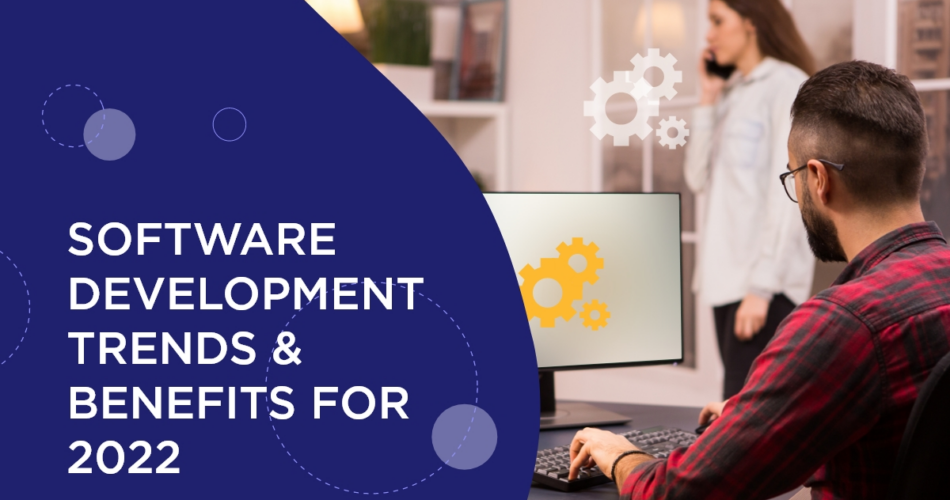Trends fluctuate or evolve throughout time. Whatever field you’re in, what’s popular right now won’t last long. When it becomes obsolete, it will either be replaced with something better or there will be significant improvements to prior trends. It is vital for every organisation to stay current with industry trends in order to ensure that their customers have the best (and most recent) experience possible and that the firm does not fall behind in the race.
The same will be seen in software development going forward in 2022, as with every other industry trend and developers will need to keep an eagle eye on these developments. Your existing procedures may become obsolete in the not-too-distant future. Software development firms must be aware of these software development trends and well-informed on what they bring and how they intend to reform the present procedure. Being aware of these patterns also allows businesses to strategize appropriately throughout software development.
Trends in Software Development and their Advantages:
- AI and Machine Learning Are Becoming More Relevant: Artificial Intelligence and machine learning are no longer regarded as specialist technologies accessible solely to a few high-end organisations. They are applied by businesses of all sizes and from all major industries. These technologies entail analysing large amounts of data and teaching machines to think like humans. As Artificial Intelligence and machine learning act as extensions of their personnel, this provides additional support to enterprises.
Predictive analytics has proven to be one of the most effective applications of AI and machine learning. Organizations utilise these technologies to evaluate their customers’ behaviour and predict their actions in a calculated manner. When it comes to acquiring sales data from multiple clients and determining their preferences, the use of AI algorithms is likely to grow.
- Putting Cybersecurity First: The significant transition to internet platforms, particularly in this pandemic era, has revealed weak links in digital environments. Cyber-attacks have recently increased in frequency and severity and if not handled with the highest care and attention, may lose businesses millions of dollars. Here are some of the biggest cybersecurity trends that will likely have an impact on the world in the coming year:
- 5G: It is certain to have a significant impact on connection, particularly in more isolated places that have previously experienced connectivity challenges. 5G is expected to make communication and cooperation more efficient and effective.
- Breach of the Clouds: As a result of the COVID disaster, numerous firms across many industries have shifted to cloud-based technologies.
- Cybersecurity Insurance: As the number of users of digital tools and platforms grows, they will want their data to be secure and to be reimbursed in the event of data loss.
- Combating Cyber-Attacks: Organizations all over the world are likely to deploy automated cybersecurity platforms that safeguard the privacy and security of their sensitive data and are opting for software development services.
- Increased Internet of Things Integration: Because of its ability to collect massive amounts of data from sensors, process it, and filter it through cloud networks, IoT is already being actively used in a variety of industries. The usage of IoT provided enterprises with low failure rates, great security, and insignificant data transformation delays. It is also possible that corporations will employ it to streamline remote work.
- The Big Data Industry Is Growing Consistently: According to technology experts, there are more bytes on the planet than stars in the sky! The importance of big data is only going to grow with each passing year. It is just a matter of time before firms begin to optimise technology to improve their day-to-day procedures.
Here are the two primary areas where big data is expected to succeed in the coming year:
- Computation in Memory: In-memory computation can be viewed as an alternate method of accelerating business analytics. The most obvious advantage of this technology is the ability to process data in real-time.
- Augmented Reality and Analytics: As a result, the time it takes to clean and prepare your data is significantly reduced. Augmented analytics will allow firms to gain daily insights from their tools while saving data scientists a significant amount of work. Any reputed firm providing software development services can support this.
- An Increase in the Development of Progressive Web Apps: Today’s app users are unwilling to wait for the platform to download for an extended amount of time. We live in an era of immediate pleasure. Progressive web apps (PWAs) are significantly faster and lighter to download over the internet. The user experience is not affected because the services provided by them are identical to those provided by native programs.
When it comes to developing these apps, the procedure is faster and less expensive than constructing traditional and native applications. This is due to the fact that these programs do not require various versions or devices.
- Java and JVM Will Remain Favored Technologies: Java has carved out a position in the IT industry since its introduction into the realm of software development in the mid-1990s. It is considered as one of the world’s most powerful programming languages, allowing developers to create and deploy highly responsive programs across numerous platforms.
It offers a lot more to offer developers and users, such as high stability, high flexibility, automatic memory allocation, a large number of open-source libraries, widespread use in Android app development, and much more.
- Increased Use of Cloud-Based Applications: Finally, the increasing popularity of cloud-based applications is a trend that will undoubtedly continue in 2022. Organisations all over the world have been migrating away from traditional storage systems and toward cloud-based platforms since the COVID disaster. Given the rapid digitisation of corporate operations across all industries, it is safe to predict that more enterprises will join the ranks of organisations moving to cloud-based platforms in 2022.
Conclusion:
These are some of the 2022 software development trends. With a greater grasp of these trends, businesses can guarantee that any software they develop is future-proof and that they do not fall behind in the race.
Source link




